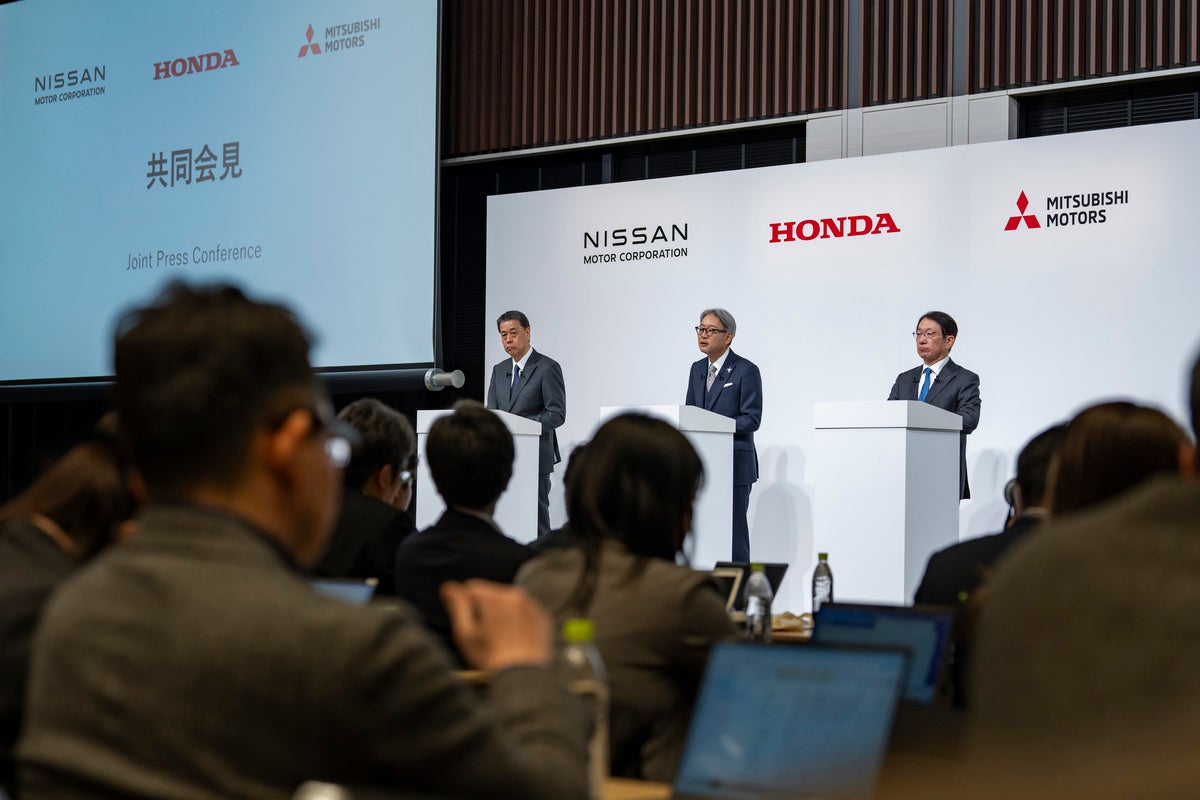
In late December 2024 Nissan Motor and Honda Motor confirmed that they had agreed to immediately begin “discussions and considerations” towards fully integrating their automotive businesses under a new joint holding company. Given the growing challenges facing global automotive industry, particularly with the rapid expansion of Chinese automakers in the global electric vehicle (EV) segment, the merger can be seen as a progression of their strategic battery electric vehicle (BEV) partnership announced less than a year ago.
Global vehicle manufacturers have been taken by surprise by the rapid rise of China’s electric vehicle industry, both in terms of vehicle manufacturing volumes, economies of scale and technological advancement in the battery supply chain, as well as their progress in other advanced technologies such as autonomous driving and connected technologies.
Nissan and Honda have collaborated on various projects over the years, mainly to share development costs and increase economies of scale in low-volume vehicle segments, including mini-vehicles and commercial vehicles. More recently they extended their collaboration to include the development of hybrid and autonomous driving technologies.
The two Japanese automakers remain far behind many of their global rivals in rolling out BEVs globally, however, despite Nissan being a pioneer in the global BEV segment – when it launched mass production of the Leaf battery-powered small car back in 2009.
Nissan’s existing “Alliance” with Renault has been slowly falling apart, since the ouster of Nissan’s former CEO Carlos Ghosn after financial misconduct charges were brought against him in Japan in 2018. After more than two decades of partnership, the two companies had made only marginal progress in sharing costs and developing synergies – which Nissan now views as a loss of valuable time as global competition continued to be ramped up – particularly by other Asian manufacturers.
Renault has sold down its stake in Nissan in the last year, to 35.7% as of the end of September 2024 from 43.4% a year earlier, with most shares held by a French trust. The French automaker has indicated it plans to continue to sell down its stake in Nissan, as it too looks to map out a new future with new strategic partnerships – including with China’s Geely Auto.
World’s third-largest automaker
Honda and Nissan have confirmed that they would like to include Mitsubishi Motors in their merger, creating an entity that would overlook the sale and production of close to eight million vehicles annually based on 2024 data – which would make it the world’s third-largest vehicle manufacturer globally after Toyota Motor Corporation and Volkswagen Group. Mitsubishi, a junior partner in Nissan’s “Alliance” with Renault, is expected to assume a similar role in the Nissan-Honda merger.
With Nissan’s finances deteriorating rapidly, both Nissan and Honda have agreed not to waste time in implementing their merger plan. The two companies plan to have a definite agreement on their integration plans by June 2025, including an agreement on the transfer of shares to the holding company and their respective shareholdings. Extraordinary shareholder meetings are scheduled to take place in April 2026 as the two automakers look to gain formal approval of their merger plans by the respective shareholders, before de-listing their shares from the Tokyo Stock Exchange in August 2026. The actual transfer of shares into the holding company is also planned for August 2026.
Synergies from full integration
The two companies have laid out the potential synergies they aim to achieve from their business integration, a process which will be overseen by an “integration preparatory committee” to be put in place to ensure “smooth integration” and conduct focused discussions. The stated aim is for Nissan and Honda “to become a world-class mobility company with sales revenues exceeding JPY30trn (US$190bn) and an operating profit of more than JPY3trn (US$19bn).
The merged company will aim to standardise vehicle platforms across the two brands in various product segments, with a view to creating stronger products, sharing development costs, increasing economies of scale and improving investment efficiencies through standardized production processes. The two companies have already started joint R&D of platforms for next-generation software-defined vehicles (SDVs) and this will be stepped up following the merger, along with other areas of technology development including BEV powertrains and autonomous driving.
Nissan and Honda also plan to optimise their global production operations, by sharing production lines to improve manufacturing efficiency. This is expected to improve capacity utilisation and reduce fixed costs. Purchasing operations will also be combined to maximise the benefits of sharing platforms and components, resulting in increased economies of scale. Other functions will also be combined, including operating systems and back-office operations, which will also reduce costs.
Key questions remain
Perhaps the biggest question that remains outstanding is, who will control the merged company? Analysts clearly expect Honda to become the largest shareholder, given its relative strengths and market capitalisation compared with Nissan. This could make Mitsubishi’s junior role in the proposed joint venture pivotal. Once the final terms of the joint venture are agreed, Honda is expected to spin-off its considerable non-automotive businesses into a separate company.
Both Nissan and Honda currently have limited global BEV sales, reflecting their limited product ranges compared with Chinese competitors and upcoming models from European and South Korean manufacturers. It will take time for synergies between the two companies to be established, with a significant range of new jointly-developed BEVs and SDVs not expected to be in place until much later in the decade. Given the rapidly rising global competition, some analysts are questioning whether Nissan and Honda will be afforded enough time to implement their joint new product development plans.
The cost of restructuring to integrate the production operations of the two companies, and to transition production to BEVs and other zero-emission technologies, will be enormous. China alone will be a major challenge. Globally, there is significant duplication of products, technologies and production facilities between the two companies, meaning the amount of restructuring required will be substantial. The transition to zero-emission vehicles needs to be made in any case, so doing it as a combined entity with much larger economies of scale will probably help.
Carlos Ghosn, who led Nissan for 19 years until his ouster in 2018, in a recent interview described the proposed merger. He said: “Without any doubt, Honda is going to be in the driver’s seat. There is practically no complementarity here, which means if they want to develop synergies it is going to be through cost reduction, elimination of duplication of plants and technology development, and we know exactly who’s going to pay the price. It’s going to be the minor partner, and it’s going to be Nissan.”
“Will Honda be in control if Nissan and Honda merge?” was originally created and published by Just Auto, a GlobalData owned brand.
The information on this site has been included in good faith for general informational purposes only. It is not intended to amount to advice on which you should rely, and we give no representation, warranty or guarantee, whether express or implied as to its accuracy or completeness. You must obtain professional or specialist advice before taking, or refraining from, any action on the basis of the content on our site.
EMEA Tribune is not involved in this news article, it is taken from our partners and or from the News Agencies. Copyright and Credit go to the News Agencies, email news@emeatribune.com Follow our WhatsApp verified Channel




